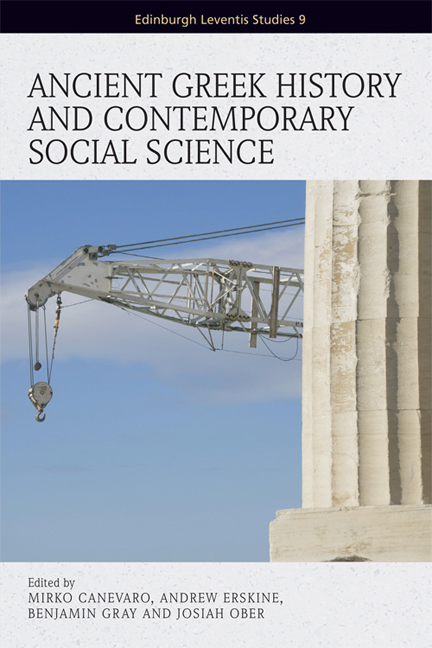9 - Understanding the Politics of Pericles around 450 BCE: The Benefits of an Economic Perspective
Published online by Cambridge University Press: 06 May 2021
Summary
INTRODUCTION
Pericles is usually presented as a great statesman and an astute politician who was, for many years, the undisputed leader of the Athenians and the initiator of the great building projects on the Acropolis. This chapter argues that he was probably even more astute than modern scholarship has suggested. At the same time, our analysis demonstrates the usefulness of applying an economic approach to the examination of ancient society.
Over the last few years, economists have been increasingly involved in the analysis of the ancient world, bringing rational-actor models to the fore. Until recently, the position presented by Moses Finley in his Ancient Economy (1973) dominated the field, namely that economic theory was of no use in the study of the ancient world. Finley's standpoint has, however, been forcefully questioned, and several humanities scholars now argue for the potential usefulness of an institutional economics approach.
If the same issue is analysed under two different scientific paradigms, it is to be expected that the results will be at least slightly different. It is as though we were looking at the world while wearing different scientific eyeglasses. For one thing, some eyeglasses correct our near vision, whereas others enable us to see things in the distance. Economics generally aims to get rid of the messy details and thereby uncover the structural forces in society. For the humanities, in contrast, ‘God is in the details.’ For another thing, as also explored in other chapters in this volume (especially in Part I), social science and humanities approaches are often based on contrasting assumptions about, and models of, human motivation and decision-making. Many economic approaches make simplifying assumptions about the primacy of material incentives in motivating individuals’ decision-making, which is interpreted mainly as strategic maximisation (though note Lewis’ chapter in this volume on behavioural approaches which insist on a multi-faceted model of human motivation). The core of rationality in the economic paradigm is the assumption that individuals have reasonably well-defined preferences over the outcomes of their actions (and strive for the best outcome for themselves). This is often (but not always) a powerful analytical tool.
- Type
- Chapter
- Information
- Ancient Greek History and Contemporary Social Science , pp. 269 - 292Publisher: Edinburgh University PressPrint publication year: 2018



